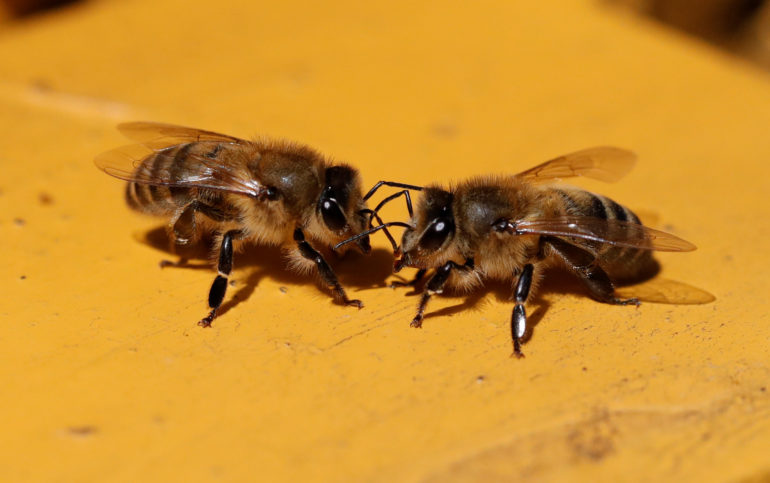
Pesticides that cause honey-bee colony collapse will be phased out over the next five years. (Reuters/Tatyana Makeyeva)
Lindsay Charlton
The Canadian government announced it will be banning the outdoor use of a common pesticide widely linked to the death of bees.
But one critic says Ottawa isn’t moving fast enough to protect the pollinators.
Neonicotinoids are common pesticides used in the production of corn, canola and soybeans. A number of field studies found strong evidence suggesting the controversial synthetic pesticides are harmful to bees and other pollinating insects. The European Union banned certain strains of the toxin and has since expanded to a near total ban in April 2018.
“They are extremely toxic and they’re a neurotoxin,” said Friends of the Earth senior policy advisor, John Bennet. “If they don’t kill the bees or insects outright, they often can affect their behaviour and their ability to navigate and their ability to gather food.
“They can weaken a whole hive over time, so they are an extreme problem for the bees. These are systemic pesticides which are actually inside the plant and inside the pollen and inside the nectar, they get into the dust during the planting season as well,” he said.
Canada is following the European Union’s lead, but will be phasing out the pesticide over the next few years.
This may not be fast enough for the bees, Bennet fears.
“If something is toxic and considered unacceptable for the environment, then it should be treated like anything that’s toxic and unacceptable and it should be done rapidly and two to five years is not rapidly. Unfortunately, the government is prepared to meet the needs of the pesticide industry over the needs of the environment,” he said.
The pesticide is wide spread across millions of acres of land and can contaminate the ground for up to three years once the farmer has stopped using them, he said. The buzz surrounding the issue has been largely supported by activists and the public is responding very strongly to the peril of pollinators.

Pesticides continue to remain in the soil even after three years after use stops. (Reuters/Tatyana Makeyeva)
“We’ve had hundreds of thousands of people submitting comments, signing petitions, talking to politicians asking for action. There’s been a disconnect between public support for taking action and government actually acting so this is a big step,” Bennet said.
He says removing these pesticides will contribute toward the ongoing issue of colony collapse. The government, however, is not directly addressing the particular safety of the bees, Bennet said.
“The government has yet to admit that these pesticides are a problem for our bees but they have found them building up in Canadian water ways to levels that actually threaten the invertebrates and insects in the waterways and that’s actually the reason they’re taking them off the market,” he said. “But I don’t care what the reason is, getting them off the market is what we need to do.”
The bee and pollinator decline around the world has been an ongoing concern since the late 1990s when farmers noticed a rapid disappearance of bees, according to Greenpeace. While pesticides aren’t the only threats these creatures face it affect them at grassroots levels.
“Unlike previous generations of pesticides which were only applied when the pests were actually there, Neonics are actually used as a prophylactic,” Bennet said. “They spray it on the seed before the plant is put in the ground and as the plant grows it absorbs the pesticide and the plant itself becomes toxic to the insect.”
Bennet says restoring and maintaining bee habitats are vital.
“Agriculture has changed significantly in the last decade and small areas with wild flowers and plants that actually provide the food for bees and pollinators is rapidly disappearing. So we all need to be creating bee and pollinator habitats,” he said.
“We need people across the country to do the same and we need municipalities to create bee friendly areas and pesticide free areas so we can continue to foster the growth and development of pollinators of all types,” Bennet said.

